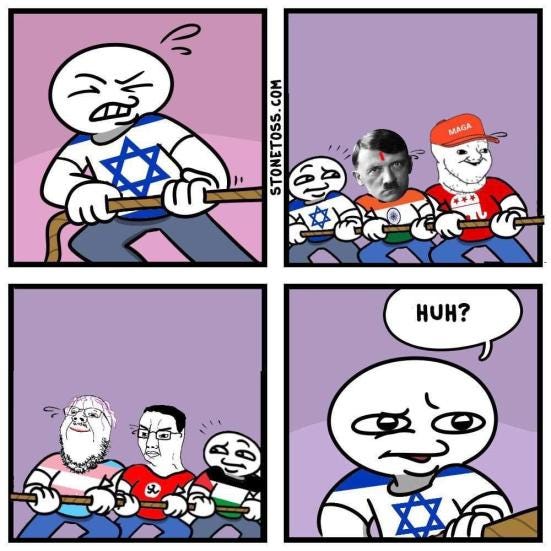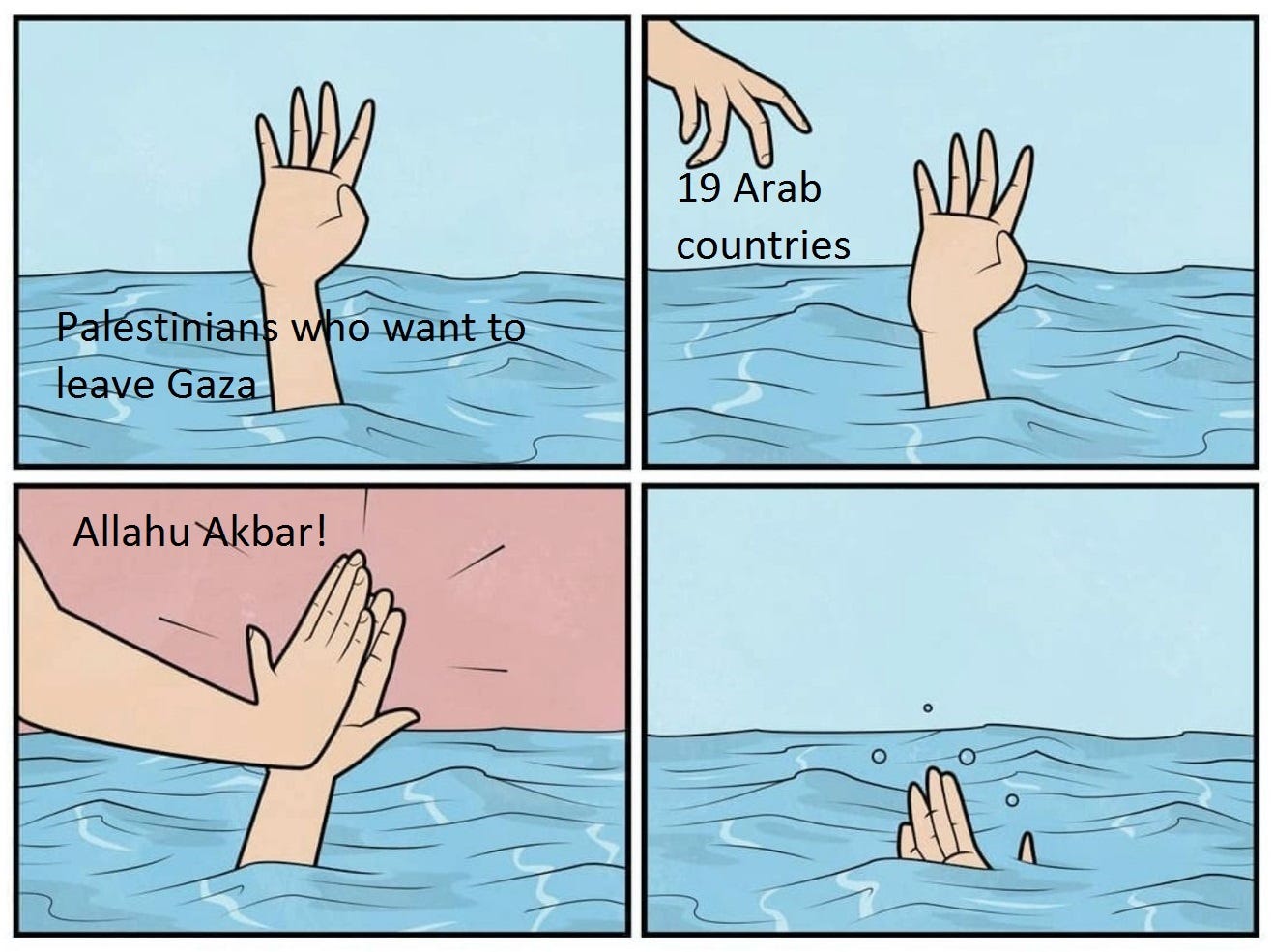People in the West are struggling to decide who the “bad guys” are in the Israel-Hamas war.
This lack of moral clarity exposes the ad hoc nature of morality. People make moral judgments by pattern-matching. They have (subconsciously) learned a bunch of moral patterns from experience. To make a moral judgment about an event, they (subconsciously) try to fit the event to some moral pattern. In many cases, the event clearly fits a single moral pattern, and this produces a clear moral judgment. In other cases, however, the event matches multiple patterns that have different polarity. This produces moral conflict.
Where do moral intuitions come from? Social cues, especially labeling. If a child is told “X is bad” on a regular basis, then the child will learn to view X as bad. Moral intuitions are knowledge about the moral judgments of others.
Is this circular? Yes. So are other types of cultural knowledge, such as language. We learn language from speech, and then we use it to speak. Language is knowledge about how people speak.
See What is Morality?.
In the modern West, most people have acquired a lot of (fake) knowledge from TV shows, movies and other entertainment. This knowledge is conceptual, not explicit. (See Theories of Knowledge.) Conceptual knowledge is acquired and applied subconsciously. From those sources, people have learned moral narrative patterns, and they expect real events to fit those patterns. In most movies and TV shows, there are clear “good guys” and “bad guys”. In reality, things are different.
Most people in the West had moral clarity about the Russia-Ukraine war. Russia was the aggressor and invader. Ukraine was the innocent victim. Putin was the evil tyrant dictator. The reality was somewhat more complex. However, the event fit an existing moral pattern pretty well, and that pattern was reinforced by the media. The media presented the event as a moral narrative, with good guys (Ukraine, Zelensky) and bad guys (Russia, Putin). It was easy for the public to accept this narrative.
The Israel-Hamas conflict is different. The immediate events fit an aggressor-victim pattern, in which Hamas is the aggressor and Israelis are the victims. There are horrific images and videos of victims, including children and young women, being killed, brutalized and humiliated. This naturally makes people sympathetic toward the Israeli side. It makes Hamas look like barbaric terrorists.
However, on a larger scale, Palestinians seem like innocent victims of Israeli oppression. Israel is an ethnostate. Essentially, it is based on ethnic and religious bigotry. The Palestinians are a refugee population from Israeli ethnic cleansing in the past. They are trapped in small enclaves: the West Bank, East Jerusalem and the Gaza strip. The Gaza strip is extremely densely populated and quite poor. Israel has been blockading it since 2007. So, the Palestinian people have grievances that seem legitimate to Westerners, while the Israelis look like oppressors.
Also, the Palestinians are poor and brown, while Israelis are rich and white or whitish, especially the Ashkenazi Jews. In the West, people have been trained to view whites as bad guys and non-whites as good guys. They have also been trained to not be “Islamophobic”. So, they naturally tend to take the side of non-whites and Muslims. That moral stance cannot get you fired from your job, or kicked off social media, unlike the opposite stance.
On the other hand, people naturally tend to side with those who are more like them in appearance and culture. Israelis are more like us than Palestinians are. So, there is some natural sympathy in that direction.
The left takes the side of Muslims in the West, but Islam and modern leftism are strange bedfellows. Muslim attitudes toward feminism and LGBTQ clash with leftist views. So, that’s another source of moral confusion for the left.
There is also the effect of Jews in the West who (gasp!) are disproportionately represented in the media, academy and government. Most of them naturally side with Israel in this conflict, even if they are on the left politically. Many Jews in the West are hypocritical about ethnic nationalism: supporting it for Israel while rejecting it for European societies. Israel has a border wall, and keeps out foreigners, but allows immigration of Jews. It would be considered Nazism if the United States or any European country had the same policy.
For those few people who look at statistics, far more Palestinians have been killed by Israelis in the past few decades than vice versa, including many non-combatants.
Israel is now bombing the Gaza strip, and killing civilians in the process. Images of crying children and dead bodies are more powerful than statistics, and both sides parade their victims on social media, as a form of memetic warfare.
The left has an especially hard time identifying the bad guys in this conflict, since it fits their ideology in multiple ways, and they have conflicting moral allegiances (LGBTQ, Jews, Muslims, non-whites, poor).
The right has its own internal conflicts. Is Israel “our greatest ally”, which we must “stand beside” in every conflict? Should we support the Jews because they are God’s chosen people and they have a divine right to Israel? Or is Israel just another country and not our problem? Is it a pernicious source of foreign influence?
The dissident right is also conflicted to some extent, although the prevailing sentiment is against both sides. The dissident right is generally hostile toward both Jews and Muslims. But many in the dissident right support ethnic, racial or religious nationalism. They believe in a narrowly defined in-group. In that way, they agree with both sides in the conflict.
Ramzpaul likes to say “every people has a right to a homeland”, but this is utter nonsense. What is “a people”? What is “a homeland”? Why would a people have a right to a homeland? Where does this right come from? What if two peoples claim the same homeland? How do you resolve that conflict? Does God come down as a burning bush and tell us whose land it is?
The concept of a national homeland is the right-wing version of magic dirt theory. Societies acquire land by conquest, not by moral right.
Both the Israelis and the Palestinians believe that they have a moral right to the land currently called “Israel” and formerly called “Palestine”. Both view it as their homeland. Both can trace some of their ancestry back to antiquity in that land. Over the centuries, it has been governed by many different political units: British, Ottomans, Mamluks, Arabs, Romans, Greeks, Persians, Babylonians, Jews, etc.
Rights and obligations don’t exist in nature. They are social constructs. They are defined and imposed by societies. There is no cosmic good and evil. There are no cosmic rights and obligations.
Meanwhile, some are calling out the Nietzschean wing of the dissident right for hypocrisy. People like Bronze Age Pervert celebrate tribal warfare and conquest as an abstract ideal, but are squeamish about the real thing. Muslim men seizing “war brides” and slaughtering their enemies in real life is not as aesthetically pleasing as a marble statue or an aphorism.
There is no moral solution to the Israeli-Palestinian conflict. Both sides believe that they are good and the other side is evil. Both sides believe that they have a moral right to the land. Atrocities have been committed by both sides. Jews will say that they need a homeland to protect against another holocaust. Palestinians will say that they are being genocided right now.
The reality is that this war is a conflict over resources in a very densely populated area.
Over two million people live in the Gaza strip. It has an extremely high population density: more than 5,000 people per km2. That is higher than many cities. The total fertility rate (TFR) is 3.6 children per woman. Over 40% of the population is below 15 years of age. Per capita income is hard to estimate, but it is quite low. Most people live in poverty, by Western standards.
The Palestinians — especially those in the Gaza strip — have nowhere else to go. Land is scarce in that region. They could work in intensive agriculture or manufacturing, but that is difficult given the blockade and the small size of the country. They cannot support their growing population on their small, overcrowded strip of land.
Israel wants to get rid of them and take their land, and it will probably use the current crisis as a “moral” justification for doing that. But what will happen to the people? They are already a refugee population living in a tiny strip of land. Israel doesn’t want them. Egypt doesn’t want them either. It has its own problems: a growing population that it can barely feed.
Behind the moral posturing on both sides, there is a basic conflict of interest. Land is a finite resource. Population growth leads to conflict over land. As we go deeper into the 21st century, there will be more conflicts like this one.
Thanks for reading. If you found this interesting, please share and subscribe.








The only moral solution is: resurrection of the Holy Roman Empire and conquest of the holy Land and City by force and rule over the Arabs and Jews at the same time. Deus Vult. Btw: I talked to a Palestinian refugee today who I work with and he said that the other arab nations don’t officially welcome the Palestinian Refugee so that the Israelis don’t have another moral justification for conquering the land (because right now they can’t go no where and it would be to bad for the Public relations to simply kill them all so they can only advance slowly)